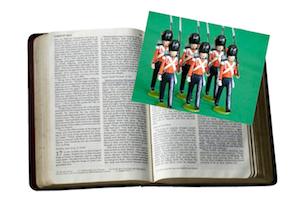
Cartoon by Glenn McCoy
Some of my Christian friends support war when that war can be defined as a just war. Not everyone who holds this position is versed in “just war theory,”so I guess we can’t expect all wars to meet those criteria in order for them to receive general approval from the Christian community. But I think we need to examine the so-called war on terrorism.
Most recognize that this is not a traditional war. It’s not always easy to define who the participants are. Some would compare it to the war on poverty or the war on drugs, that is, the term war being used to describe something that isn’t exactly war. But this war sure looks like a war. It’s the regular troops being sent out. The deaths are real. The destruction is real.
There are real dangers in allowing something to be “like a war,” without being an actual war. Exceptional powers are being given to those in government, to those in the intelligence agencies and to those in the military, all with the justification that “we are at war.” Such powers would normally be granted until the end of a war; who will declare the war on terrorism to be over?
Ten years ago, Stanley Hauerwas wrote an excellent article on these ideas. Hauerwas wrote:
The good thing, moreover, about the war on terrorism is it has no end, which makes it very doubtful that this war can be considered just. If a war is just, your enemy must know before the war begins what political purpose the war is to serve. In other words, they need to know from the beginning what the conditions are if they choose to surrender. So you cannot fight a just war if it is “a war to end all wars” (World War I) or for “unconditional surrender” (World War II). But a “war on terrorism” is a war without limit. Americans want to wipe this enemy off the face of the earth. Moreover, America even gets to decide who counts and does not count as a terrorist.
Two very important points right there:
- There is no defined end to this war. What are the objectives, beyond obliterating the enemy? Who can sign a peace accord for the opposing side? When will the world be able to say, “That’s it… no more terrorism. The war is over.”?
- There is no clear definition of who the opponents are. The U.S. government determines who is and who isn’t a terrorist. It defines what nations are state sponsors of terrorism, with those decisions sometimes being made on the basis of other political motives. When one side can decide for itself who its enemies are and continue adding to that list as the war goes on, there’s nothing just about the war.
On that second point, Hauerwas wrote:
Which means Americans get to have it any way they want it. Some that are captured, for example, are prisoners of war; some are detainees. No problem. When you are the biggest kid on the block, you can say whatever you want to say, even if what you say is nonsense. We all know the first casualty in war is truth. So the conservatives who have fought the war against “postmodernism” in the name of “objective truth,” the same conservatives that now rule us, assume they can use language any way they please.
That Americans get to decide who is and who is not a terrorist means that this is not only a war without clear purpose, but also a war without end. From now on we can be in a perpetual state of war. America is always at her best when she is on permanent war footing. Moreover, when our country is at war, it has no space to worry about the extraordinary inequities that constitute our society, no time to worry about poverty or those parts of the world that are ravaged by hunger and genocide. Everything—civil liberties, due process, the protection of the law—must be subordinated to the one great moral enterprise of winning the unending war against terrorism.
Christians who believe in just war need to stop supporting the so-called war on terrorism. There is nothing just about it. It’s just war, plain and simple.

 As we look at questions of justice on a global scale, we quickly come to see that situations are very complex. For example, disputes over territorial claims aren’t easily resolved. (Anybody remember
As we look at questions of justice on a global scale, we quickly come to see that situations are very complex. For example, disputes over territorial claims aren’t easily resolved. (Anybody remember 

